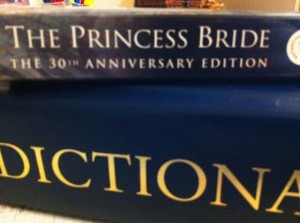“He’ll never catch up!” the Sicilian cried. “Inconceivable!”
“You keep using that word!” the Spaniard snapped. “I don’t think it means what you think it does.”
That line from Inigo Montoya in William Goldman’s The Princess Bride has become quite famous over the years. And no wonder: most of us, at some point or another, have experienced the irritation or frustration of hearing someone else use a word in an incorrect context – and also have had the embarrassment of using a word incorrectly ourselves!
One of the biggest troubles with words (as well as one of the most exciting things about words) is how frequently we use words without *really* knowing what it means. Think about it. Take a word, any word. Preferably one that you use in everyday conversation. Can you define it? Not just find a synonym for it – but really truly define it? Probably not. I know that I usually can’t.
Mr Science has an excellent vocabulary. He likes to use big words in sentences, but often when he does, we both have to pause for a moment: we both know that he used the word in the right context, but can’t quite pinpoint what exactly the word means. So, of course, we open up a dictionary (or, more often, use an online dictionary. Thank you, smart phones), and learn what the word means. It’s fun!
When I was younger and writing novels with every spare moment I had, I used to do this all the time: I would use big words that I didn’t actually know what the definitions were. I got into rather a bad habit with using words that I didn’t know the definition of. In fact, it wasn’t until university that I began to look in dictionaries when I wasn’t sure about the definition. One of my professors had assigned reading for all of us students, and at the next class, he asked us if we knew what a word meant that was in the book. We all shook our heads. He just stared at us and said, “And… none of you thought to look it up?”
I think he was more disappointed than anything else, that a bunch of Rhetoric majors hadn’t taken the time to look words up in the dictionary (which, admittedly, is rather sad). Since then, I always look words up in dictionaries. It’s a satisfying and enlightening process! Even better is the fun that comes with guessing a definition, and then looking it up to see who was closest (yes, that is an actual game my family used to play around the dinner table. And it is awesome).
The other side of the coin here is using words incorrectly (as with our lovely quote from The Princess Bride). The mother dear and I were just discussing today about the word “peruse.” In our society, it tends to be used as a word to describe someone glancing through something, or flipping through something quickly. In fact, it means the exact opposite: “peruse” means to look at something in great detail. Somehow this word has been misused time and time again until we don’t even know that we are using it incorrectly! Sadly, there are many words like this out there. But by looking words up in the dictionary when we cannot definitively define them (heehee), we can both educate ourselves and deal with this trouble with words!

Love, love, LOVE The Princess Bride.
Here are some words that I have read but could never “quite” define them. (I am WAY better at medical terminology.)
Brevity
Ephemeral
Cavil
Fissiparous
Truculent
Tenebrific
Laconic
Hubristic
Polemic
Perspicacity
and finally…Sesquipedalian
Ooh great words! There are definitely a few there that I haven’t even heard of. To the dictionary! 🙂